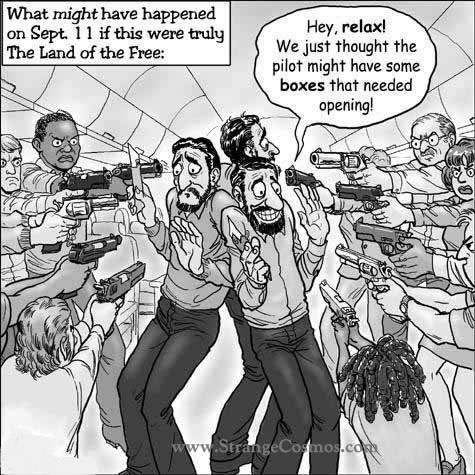Close window | View original article
How Not To Fix the TSA
Bureaucracy cannot solve ever-changing threats.
We've been pointing out fundamental flaws with the TSA since as long as there's been a Scragged. It's gratifying to see that other media are finally beginning to catch on - maybe, over time, even the mainstream media journalists have realized that the guy with the rubber glove is gunning for them too? Unfortunately but not the least bit unexpectedly, they utterly fail to grasp the root cause of the problem.
The Wall Street Journal published "Why Airport Security is Broken - And How To Fix It" by Kip Hawley, who headed the TSA from June 2005 until Mr. Obama was inaugurated in 2009. He states the problem succinctly:

More than a decade after 9/11, it is a national embarrassment that our airport security system remains so hopelessly bureaucratic and disconnected from the people whom it is meant to protect. Preventing terrorist attacks on air travel demands flexibility and the constant reassessment of threats. It also demands strong public support, which the current system has plainly failed to achieve.
The basic problem is that the TSA is still responding to the terrorist threat of 9/11 where men armed with box cutters took over airplanes and crashed them into buildings. As al-Qaeda knows perfectly well, that sort of attack is simply not going to work any more, TSA or no TSA. Cockpit doors have been reinforced, pilots are armed with axes, and passengers all know that being hijacked is a death sentence unless they take the plane back. That's why al-Qaeda hasn't tried to do it again that way; even the similar attempts they've made, like the underwear-bomber and shoe bomber, fell foul to alert passengers.
No, the hijacking paradigm has shifted, but the TSA remains mired in the psychology of the previous decade.
The agency is also being micro-managed by Congress:
By the time of my arrival, the agency was focused almost entirely on finding prohibited items. Constant positive reinforcement on finding items like lighters had turned our checkpoint operations into an Easter-egg hunt. When we ran a test, putting dummy bomb components near lighters in bags at checkpoints, officers caught the lighters, not the bomb parts.
I wanted to reduce the amount of time that officers spent searching for low-risk objects, but politics intervened at every turn. Lighters were untouchable, having been banned by an act of Congress. And despite the radically reduced risk that knives and box cutters presented in the post-9/11 world, allowing them back on board was considered too emotionally charged for the American public. [emphasis added]
What does he suggest?
- Recognize that a few lightly-armed guys aren't going to be able to take over a plane any more and allow small knives, liquids, and other such objects on board. His opponents don't believe that American travelers are capable of understanding such advanced concepts as the risk having shifted, but we feel otherwise.
- Encourage TSA officers to take the initiative by being less bureaucratic. It's hard to believe he'd suggest this - a non-bureaucratic government agency is a contradiction in terms. It's even more difficult to imagine exactly how that's supposed to work: how can you possibly rate the workers on planes not blown up or on terrorists captured, when neither has happened even once in the last decade? It's easy to weigh the piles of confiscated paraphernalia and determine who's doing their job effectively.
- Ask airlines to eliminate baggage fees so people won't drag so much carry-on luggage through the system. Fat chance - airlines make billions in fees on which they don't have to pay the taxes levied on air fares.
His major recommendation is to recognize that no system can be 100% risk free. By trying to block everything on some list, no matter how silly, and publishing lists of what we can't bring aboard, we've become predictable to the point that terrorists know exactly what not to do.
Bureaucracy Uber Alles
The TSA is a classic government bureaucracy which was formed in response to the 9/11 aircraft hijacking. As with all government "service" providers, TSA employees know that their employer can't be replaced and that customers have to deal with them. There's no incentive to be efficient or effective. No matter how many fake bombs they let through, there'll always be a TSA.
When the TSA was founded, the enabling legislation allowed airports to opt out of having the TSA do their security so long as they hired contractors who met federal standards. 16 airports were wise enough to take the opportunity and replaced the TSA with private contractors. Tests have shown that these contractors, who know that they can be replaced at the stroke of a pen, find a much better percentage of fake bombs put through their scanners, have shorter lines, and shift people around to match hours of peak demand.
Why don't more airports do this? Because the legislation allows the TSA to block an airport from opting out. That's like saying that Burger King could open a new restaurant only with permission from McDonald's. How many Burger Kings would there be if that rule were in place?
Bureaucratic monopolies hate competition and will do anything to shut down alternatives instead of improving. Is it any wonder that the TSA has stopped letting airports do this, despite explicit laws forbidding them to do that?
Competition is the only cure for bureaucratic inefficiency whether in schools, medical care, the DMV, or airport security. The more government accumulates power, the more monopolistic bureaucracies will arise to kill efficiency.
It would be simple to fix the TSA - change the law to let any airport, or even any airline, opt out. As with charter schools, competition would work its magic and the TSA would either perform or die.